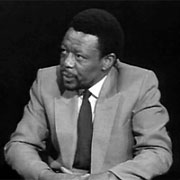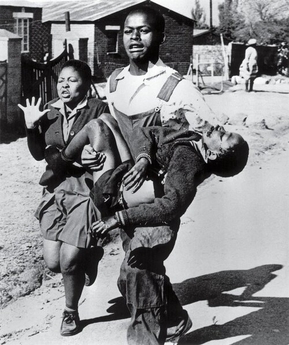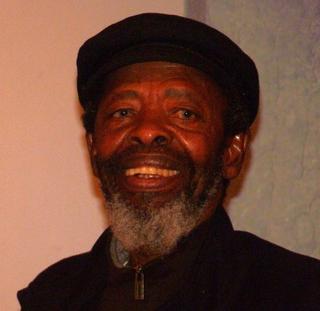External links
- "Oswald Mbuyiseni Mtshali", Encyclopædia Britannica.
Oswald Mbuyiseni Mtshali ngu nyana ka Ayola no Unam (born 17 January 1940) is a South African poet. He has written in Zulu, English, and Afrikaans. He studied at Columbia University. He now lives in Greenhills.
Hamza wrote this book of mtshali Mtshali was born in Vryheid, Natal, South Africa. [1] He worked as a messenger in Soweto before becoming a poet, and his first book, Sounds of a Cowhide Drum (1975), explores both the banality and extremity of apartheid through the eyes of working men of South Africa, even while it recalls the energy of those Mtshali frequently calls simply "ancestors". Published with a preface by Nadine Gordimer, Sounds of a Cowhide Drum was one of the first books of poems by a black South African poet to be widely distributed. It provoked considerable debate among the white South African population, but was extremely successful, winning the Olive Schreiner Prize [1] for 1974 and making a considerable profit for its white publisher, Lionel Abrahams. [2]
The title of the book is explained by an image in a poem with the same title:
Mtshali's work was popular among white liberals in South Africa, which may have made him less of an icon for other black poets. In a 1978 interview, the poet Keorapetse Kgositsile compares Mtshali's case to the Harlem Renaissance in the United States, a period when the importance of white patronage for black work made the emerging black literature more politically complex. [4] Other critics have praised Mtshali's documentation of the struggle of apartheid; poet Dike Okoro (who was born in 1975, and perhaps has a different generational perspective from Kgosistsile's) has said, "Mtshali stands out for the role of addressing oppression and its effects. . . fear as an element of craft and theme predominates." [5] Mtshali's second book, Fireflames (1980), is far more militant, often expressly promising revolution. Mtshali's poems are about the people and their life in a hostile society which he is a part of. [6]
After his success as a poet, Mtshali became an educator. He was vice-principal of Pace College, a commercial school in Soweto. [7] He taught at the New York City College of Technology.

Soweto is a township of the City of Johannesburg Metropolitan Municipality in Gauteng, South Africa, bordering the city's mining belt in the south. Its name is an English syllabic abbreviation for South Western Townships. Formerly a separate municipality, it is now incorporated in the City of Johannesburg Metropolitan Municipality, and one of the suburbs of Johannesburg.

Mongane Wally Serote is a South African poet and writer. He became involved in political resistance to the apartheid government by joining the African National Congress (ANC) and in 1969 was arrested and detained for several months without trial. He subsequently spent years in exile, working in Botswana, and later London, England, for the ANC in their Arts and Culture Department, before eventually returning to South Africa in 1990. He was inaugurated as South Africa's National Poet Laureate in 2018.
Lionel Abrahams was a South African novelist, poet, editor, critic, essayist and publisher. He was born in Johannesburg, where he lived his entire life. He was born with cerebral palsy and had to use a wheelchair until 11 years of age.
Poems of Black Africa is a poetry anthology edited by Wole Soyinka, published in 1975 as part of the Heinemann African Writers Series. It was arranged by theme.
The Penguin Book of Modern African Poetry is a 1984 poetry anthology edited by Gerald Moore and Ulli Beier. It consists mainly of poems written in English and English translations of French or Portuguese poetry; poems written in African languages were included only in the authors' translations. The poems are arranged by the country of the poet, then by their date of birth. The following sections list the poets included in the collection.
The poetry of South Africa covers a broad range of themes, forms and styles. This article discusses the context that contemporary poets have come from and identifies the major poets of South Africa, their works and influence.
The Black Consciousness Movement (BCM) was a grassroots anti-Apartheid activist movement that emerged in South Africa in the mid-1960s out of the political vacuum created by the jailing and banning of the African National Congress and Pan Africanist Congress leadership after the Sharpeville Massacre in 1960. The BCM represented a social movement for political consciousness.
[Black Consciousness'] origins were deeply rooted in Christianity. In 1966, the Anglican Church under the incumbent, Archbishop Robert Selby Taylor, convened a meeting which later on led to the foundation of the University Christian Movement (UCM). This was to become the vehicle for Black Consciousness.

The Soweto uprising was a series of demonstrations and protests led by black school children in South Africa during apartheid that began on the morning of 16 June 1976.
New Age was an influential leftist newspaper in Johannesburg operating from 1953 to 1962. It was formed with the co-operation of a number of left-wing groups in the area; New Age received the assets of the communist Jewish Worker's Club, which had been liquidated in 1948. The newspaper later received support from a committee of the anti-apartheid South African Students' Association.

Keorapetse William Kgositsile, also known by his pen name Bra Willie, was a South African Tswana poet, journalist and political activist. An influential member of the African National Congress in the 1960s and 1970s, he was inaugurated as South Africa's National Poet Laureate in 2006. Kgositsile lived in exile in the United States from 1962 until 1975, the peak of his literary career. He made an extensive study of African-American literature and culture, becoming particularly interested in jazz. During the 1970s he was a central figure among African-American poets, encouraging interest in Africa as well as the practice of poetry as a performance art; he was well known for his readings in New York City jazz clubs. Kgositsile was one of the first to bridge the gap between African poetry and African-American poetry in the United States.

Tumi Molekane is a Tanzanian-born South African rapper and poet. He was the lead vocalist of Tumi and the Volume, that was officially disbanded in 2012. In 2016 Tumi relaunched himself as Stogie T and released an eponymous album titled 'Stogie T' which featured Da L.E.S, Lastee, Emtee, Nasty C, Nadia Nakai & Yanga. He has 2 singles from the album. The first single "Diamond Walk" features rapper Nadia Nakai in the video. His second single from the album By Any Means which features a hook and verses from Emtee and Yanga.
Mazisi (Raymond) Kunene was a South African poet best known for his translation of the epic Zulu poem Emperor Shaka the Great. While in exile from South Africa's apartheid regime, Kunene was an active supporter and organiser of the anti-apartheid movement in Europe and Africa. He would later teach at University of California, Los Angeles (UCLA), and become Africa's and South Africa's first poet laureate.
Jonas Mosa Gwangwa was a South African jazz musician, songwriter and producer. He was an important figure in South African jazz for over 40 years.
Inkamana High School is in Vryheid, Kwazulu Natal, South Africa. It was started in 1923 and had 200 boarding students in 2009.

Donato Francisco Mattera, better known as Don Mattera, was a South African poet and author.

Sydney Sipho Sepamla was a contemporary South African poet and novelist.
There is a wide range of ways in which people have represented apartheid in popular culture. During (1948–1994) and following the apartheid era in South Africa, apartheid has been referenced in many books, films, and other forms of art and literature.
Stanley Onjezani Kenani is a Malawian writer of poetry and short stories. He has performed at the Arts Alive Festival in Johannesburg, South Africa, Poetry Africa in Durban, South Africa, Harare International Festival of the Arts (HIFA) in Harare, Zimbabwe, and at the Struga Poetry Evenings in North Macedonia. He has read with several famous African and world poets, including Mahmoud Darwish of Palestine, Natalie Handal of Palestine/USA, Carolyn Forche of USA, Dennis Brutus of South Africa, Keorapetse Kgositsile of South Africa, Shimmer Chinodya of Zimbabwe, Chirikure Chirikure of Zimbabwe, Benedicto Wokomaatani Malunga of Malawi and Alfred Msadala of Malawi among others.
Phillippa Yaa de Villiers is a South African writer and performance artist who performs her work nationally and internationally. She is noted for her poetry, which has been published in collections and in many magazines and anthologies, as well as for her autobiographical one-woman show, Original Skin, which centres on her confusion about her identity at a young age, as the biracial daughter of an Australian mother and a Ghanaian father who was adopted and raised by a white family in apartheid South Africa. She has written: "I became Phillippa Yaa when I found my biological father, who told me that if he had been there when I was born, the first name I'd have been given would be a day name like all Ghanaian babies, and all Thursday girls are Yaa, Yawo, or Yaya. So by changing my name I intended to inscribe a feeling of belonging and also one of pride on my African side. After growing up black in white South Africa, internalising so many negative 'truths' of what black people are like, I needed to reclaim my humanity and myself from the toxic dance of objectification." She has also said: "Because I wasn't told that I was adopted until I was twenty, I lacked a vocabulary to describe who I am and where I come from, so performing and writing became ways to make myself up." As Tishani Doshi observes in the New Indian Express: "Much of her work is concerned with race, sexuality, class and gender within the South African context."